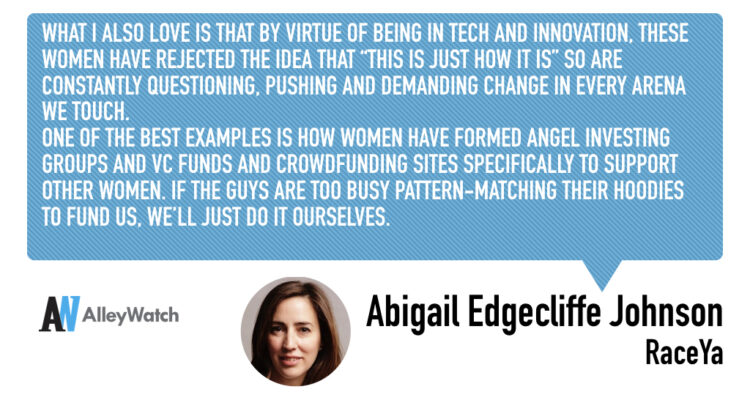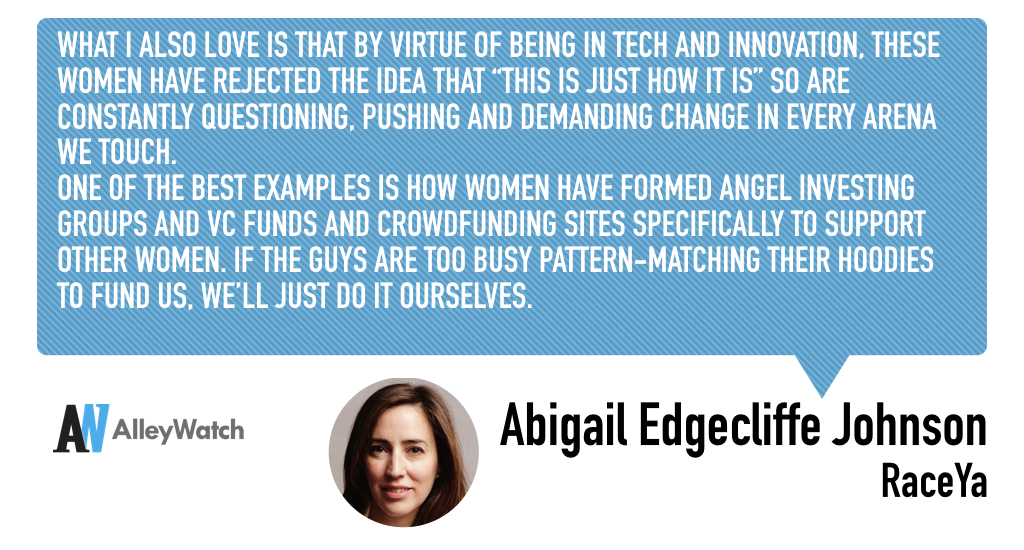Are you a woman in NYC Tech and interested in participating in this series? Make sure to read the whole article…
Much has been said and written about the lack of women in the tech sector, be it as investors (or associates), founders, or in management positions at major companies. Is the problem the old boys network – or that success in technology is seen as a young man’s game? In this series, we speak with some of the top women in tech in New York as they discuss the challenges they face, the perceptions that need to be changed and the work that’s being done – or not – to help to promote women in tech.
Today we speak with the PhD anthropologist and self taught confectionary-roboticist, Abigail Edgecliffe-Johnson. Abigail, a tech and robotics enthusiast, developed RaceYa to teach children through radio controlled cars, about science and engineering. As a woman in hardware Abigail has felt overwhelmingly supported by the people in the NYC Tech community and her company, RaceYa, is cultivating a similarly open and welcoming community for kids to help them become creators, not just passive consumers.
What’s your background and how did you develop your career as a female entrepreneur in the NYC tech ecosystem?
I fell into tech when I decided to start my company. Originally, I’d conceived of RaceYa as a retail experience where kids could build, race, and hack radio controlled cars. But in the course of researching my way into building the cars, I was drawn into New York’s start-up community. That led, of course, to the tech community, which is the most supportive and collaborative group of people I’ve ever worked with.
I came from academia, which (at least in my field of anthropology) has a very hierarchical, one could even say patriarchal, structure. It’s not typically welcoming of rapid innovation from its junior ranks. The tech scene is totally different. There isn’t a sense of needing to pay your dues before your ideas can have validity. A good idea is a good idea – just go execute.
What are the advantages of being a woman in tech?
The other women in tech. Honestly, the experience of being a woman in any industry is materially different from being a man in that same industry. Not least because, until the division of domestic labor – i.e. child care – is evened out at a national level, women will have more to juggle. Working with other women who have been there and done it is a tremendous resource.
What I also love is that by virtue of being in tech and innovation, these women have rejected the idea that “this is just how it is” so are constantly questioning, pushing and demanding change in every arena we touch.
One of the best examples is how women have formed angel investing groups and VC funds and crowdfunding sites specifically to support other women. If the guys are too busy pattern-matching their hoodies to fund us, we’ll just do it ourselves.
What can be done to further promote female entrepreneurs and women in tech in New York?
I’d love to see more being done to ensure that the balance at every event is 50/50. That goes for awards, conferences, parties, meet-ups everything. I think the way you do that is for the organizers to deliberately ask themselves who they are reaching out to and question if those channels will produce a decent balance.
A while back Trevor Noah was interviewed in the NYTimes and he told a story about not getting any audition tapes from people of color when he was hiring at The Daily Show. When he asked his friends why they didn’t audition they said they hadn’t known about the opportunity. To quote him:
“But they told me they’d sent it out to all the agents and managers. And they all went: ‘Oh, that’s where you made the mistake. We can’t get agents or managers’.”
To me, that is a perfect example of what happens to minority groups in tech. People think they have ‘put the word out’ but, to get a bit ethnographic for a moment, our circles tend to be made up of people who look like us. So ‘the word’ will tend to stay within very constrained groups. For the most part, this isn’t because people are trying to be exclusionary, it’s just how humans behave. That doesn’t mean we shouldn’t actively work against it. Humans also used to eat raw meat and hunt with stone tools but we advanced beyond that. We can advance beyond this too. Hopefully a little faster.
What is diversity to you and do you see it evolving in tech?
I think every one of your interviewees has said this so you’ll have to excuse my lack of originality but – it’s a diversity of ideas. People who have all the same life experiences will tend to tackle a problem from the same angle. More diverse experiences lead to more diverse solutions. That’s why economic diversity on teams is so important. If everyone on your team has an Ivy League pedigree and a house in the Hamptons they probably haven’t had to overcome their struggles with the same degree of ingenuity as someone without a strong safety net.
I think the evolution could come from the growth of remote teams, as living costs rise further in urban centers. When you need to look for talent online instead of next door, there could be more opportunities to expand and diversify networks both geographically and economically.
That said, try to have at least one team member with a house in the Hamptons. It’s SUPER nice out there.
Why do you think it’s important that women retain, grow, and develop into senior roles within their organizations?
I’ve said this before, but women lift as they climb. The more women get promoted, the more they will promote other women. It’s good for the bottom line. Companies founded by women perform better. Companies with women in senior leadership roles perform better. Companies with good gender balance on their teams perform better. And providing the kinds of HR support that retains women employees also sends a message to everyone on the team that this is an organization that supports and cares for its workers. That has a huge effect on retention rates, which in turn has a huge effect on overall performance.
How do you see the future of teams and interactions in a diverse environment and what implications will this have?
One of my favorite podcasts is NPR’s Invisibilia and they once did a show on norms; specifically how the social norms of an oil rig were contributing to workplace accidents. There was this hyper-masculine culture that didn’t allow the guys to show any kind of vulnerability, including asking questions. So if someone thought something wasn’t right, they wouldn’t speak up. That silence led to some truly horrific accidents.
The oil company launched a safety initiative and two social scientists were allowed to conduct a study about it. In short (though you should listen to the podcast, it’s fascinating) by getting the men to act less macho, they reduced accidents by 84% and saved the company millions of dollars. People weren’t so afraid of asking questions or questioning authority so they made fewer mistakes.
What’s so interesting about this is that a bunch of folks I know who do management consulting are currently doing a lot of work with their clients on improving communication, emotional intelligence, empathy etc. Basically all the stuff women are supposed to be good at (and we can have the nature/nurture debate another time). And it’s now being sold to predominantly male teams as “optimal” management technique.
How can women rise in the ecosystem and what are the unseen barriers?
Women can and will rise if they are not being held back.
It is also important for companies to build diverse teams with diverse backgrounds from the beginning. As I’m building RaceYa, more often than not, the people who come into my orbit are young white males. They tend to have the social and financial capital to take a risk on an early stage startup in a way many women do not. In my observation women haven’t advanced far enough in their careers as quickly to have the financial safety net their males peers do, or the financial burdens of childcare mean that any time away from the kids costs money, so working for equity can have significant financial downsides.
So companies should continually monitor and report their diversity numbers to turn unconscious bias into conscious decision making.
Please tell us about a few organizations that you are involved with or respect that are promoting women in tech.
I don’t work with organizations who don’t respect women. Though – to be fair – they probably don’t want to work with me either.
But some of my favorite groups are TheLi.st and Civic Hall. TheLi.st is a phenomenal group of women who continually push each other to do better. It’s not an uncritical cheerleading squad, but an honest, thoughtful and diverse group who want to see women and our male and non-binary allies thrive.
Civic Hall is the home for civic tech in NYC but it’s also an amazingly collaborative work environment. Maybe because all the companies there have some social good in their mission, they attract a high proportion of women-founded companies and organizations.
What can men do to participate in this discussion?
First and foremost, men should simply refuse to appear on all male panels. Then women would stop pointing them out.
And listen. Listen to what the women around them are saying without asking for dissertation level research data to back it up. When a woman tells you a story of something she’s experienced, it is not an opening to debate the validity of her reality. If she told you she had a toothache, you’d take the time to sympathize and maybe offer the name of dentist. You wouldn’t question the statistical significance of her toothache simply because you had never had a toothache. Frankly, this applies to any conversation between people of different backgrounds. Just because it doesn’t happen to you doesn’t mean it doesn’t happen.
The team at AlleyWatch believes it’s important to have an inclusive discussion around the challenges facing women in tech along with highlighting the work of the female entrepreneurs that have made NYC one of the best places for women in tech according to some recent studies. That’s why we are running this series that showcases women in tech in New York.
If you are a female founder in NYC working in tech and interested in participating in the series please visit this link or click on the image above.
Please feel free to pass this on to any women in NYC that you feel should be considered for the series. Thank you.





